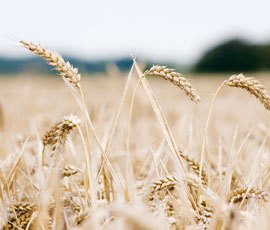Disappointment reigns for UK’s wheat harvest

Wheat yields and quality are showing little sign of improving, with low bushel weights being a common problem in what could become one of the worst harvests for many years.
Although yields were varying widely, they were averaging 7.1-7.5t/ha, well below the five-year mean of 7.8t/ha, said a report by ADAS and HGCA. Specific weights ranged from 50kg/hl to 78kg/hl and were generally below 70kg/hl, with protein contents at 12-14.5% and Hagbergs mostly above 250 seconds.
“Progress is well behind average; many crops are still not ripe, and those that have ripe grain are often still green at the base,” said the report. “Light land crops have performed better than normal, but there are a high proportion of heavy land crops that are disappointing.”
In East Anglia, harvest was about 40% complete, and milling wheat quality had held up better than feed varieties, said Rob Munro, marketing director at Fengrain. “Yields have been disappointing, and there is huge variance in quality, both around the region, on farm, and even within loads,” he said.
About 60-70% of milling wheat varieties would be usable, with more downgraded to feed than normal. “We’re probably in one of the better areas of the country, even though it doesn’t feel like it.”
Trial results from Syngenta had showed that early maturing varieties had performed far better than later varieties this year. In tests on three sites in East Anglia, Gallant had more than 80% bold grains, with Solstice producing similar results.
“Yields have been disappointing, and there is huge variance in quality, both around the region, on farm, and even within loads.”
Rob Munro
But the later variety Invicta had almost 60% shrivelled grains, with Oakley only doing slightly better, said cereals crop team agronomist James Evans. “It has been a very difficult growing season, with very high disease pressure, and early varieties have tolerated that better than the later crops.”
In Wales, harvest was proving a dismal affair, with poor yields, sticky conditions and almost non-stop rain. “We had 1.5in of rain on Monday and it’s getting a bit wearing now,” said Geoff Thomas from Pantycoch Farm, Letterston, Haverfordwest. “I’m fed up and don’t want to be a farmer anymore. It’s just appalling.”
Oilseed rape had struggled to yield 3t/ha. “It just hadn’t filled properly – you can’t farm without sun. Harvest has just been a drag from beginning to end, although the price is helping, of course.”
Winter barley and oilseed rape yields had also been on the light side in Angus, Scotland, where farmers had made a start on combining spring barley, said Trevor Harriman, general manager at Scotgrain. “It’s not been very clever – ground conditions aren’t great in many areas, and no wheat has been cut around here at all. It is starting to look a bit sorry for itself.”
Northern Ireland was similarly soggy, said Graham Furey, who had managed to cut his winter barley and oilseed rape at Castleview, Killyleagh, County Down. “If it dried up now it would be alright, because a lot of crops are only just ready. But if we get another three weeks of rain it will be the worst season ever, ending in a salvage operation.”

